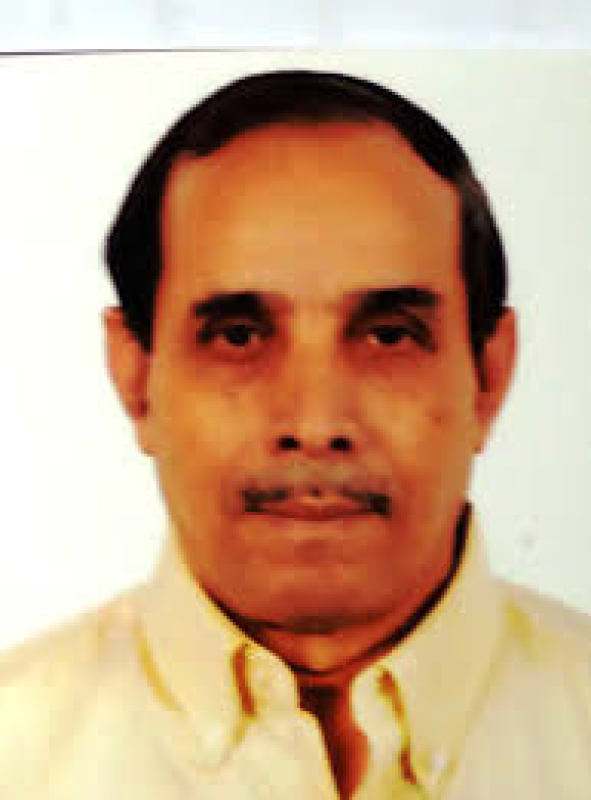- Gaza Ceasefire Not Enough as Children Continue to Die |
- Bangladesh Sets Guinness Record With 54 Flags Aloft |
- Gambia Tells UN Court Myanmar Turned Rohingya Lives Hell |
- U.S. Embassy Dhaka Welcomes Ambassador-Designate Brent T. Christensen |
- Survey Shows Tight Race Between BNP and Jamaat-e-Islami |
Reazuddin Ahmed: Journo leader who had a colourful career

Mostafa Kamal Majumder
Mostafa Kamal Majumder
Reazuddin Ahmed had a colourful career in journalism. A journalist union leader, an editor and a leader of the National Press Club. He was successful in these three spheres.
I knew him as the general secretary of the Dhaka Union of Journalists (DUJ) when I joined the profession in 1974. However my first direct interraction with him was at a programme of Dr. M N Huda, Economic Adviser to President Ziaur Rahman at Hotel Purbani International three years later in 1977.
Reazuddin Ahmed. Photo courtesy - Prothom Alo.
Reaz Bhai wanted to know from me which newspaper I did represent as I was in one of the seats reserved for journalists. Economic reporters of different Dhaka newspapers were there. I was from The Bangladesh Times. The next day, Dr. Huda's big disclosure on giving new direction to the command economy of the early 1970s made lead news in all newspapers.
His involvement in trade unionism created scopes for me to have frequent exchange of ideas as he contested DUJ and BFUJ (Bangladesh Federal Union of Journalists) elections on many occasions. Then he became a leader of the National Press Club and was elected to its positions of general secretary and president a number of times.
He concentrated on bringing out newspapers beginning in 1990 and helped the successful launch of as many as four English daily newspapers. First he lent support to Mr. SM Ali, editor of The Bangladesh Observer, after he fell from grace of its owner Hamidul Huq Chowdhury for taking up a trip with president HM Ershad disregarding his opinion, in the launch of the now famous The Daily Star. He basically came with a team from The Bangladesh Observer and helped recruit some more journalists who were familiar to him. I was also among the founder members of the paper and had good rapport with Reazuddin Ahmed. I however was chosen separately by editor SM Ali.
Mr. Reazuddin Ahmed's association with the paper helped it attract full support of the BNP government that was elected in February 1991. But soon he realised that despite being the Deputy Editor he was not really the second man to succeed SM Ali. This was because although SM Ali was in the forefront to lead the paper, the actual initiative to bring it out was taken by its present editor Mahfuz Anam who became its executive editor. Mahfuz Bhai had started working for the paper coming on lien from UNESCO he did serve for years. As the venture proved to be a success in six months, he decided to join full-time resigning from UNESCO. This made Reazuddin Ahmed to leave The Daily Star with his team and help the daily Inquilab owners to launch another daily, The Telegraph the following year. This paper however lasted only about two years and a half as the owners discontinued its publication.
Reaz Bhai then lent support to the launch of The Independent by the Beximco Group, but refrained from joining the same. Instad he helped the launch of The Financial Express by enlisting the participation of a number of business houses and became its editor-in-chief. But soon he joined as the Press Secretary to BNP chairperson Begum Khaleda Zia, then the leader of the opposition in Parliament replacing veteran politician and journalist union leader Anwar Zahid. After the 2001 electoral victory of the BNP he was offered the post of Press Secretary to the Prime Minister. Reazuddin Ahmed sought the status of a minister which he did not get and came back to the profession but failed to resume the position in The Financial Express. He then brought out another English Daily newspaper, The News Today and ran it for about a decade and sold it out to a business house. Before his death (25 December 2021 of COVID-19) he started building another newspaper, The Financial Herald which started coming out silently to fulfill some formalities before being launched publicly.
Out and out a democrat, he was acceptable to all shades of opinion among journalists. He made his mark in international journalism as the Bangladesh representative of The Financial Times, London. A founder-member of the Editors' Council, he played an important role to help keep it operational at times of crises. A recipient of the Ekushey Padak, the second highest civilian award in Bangladesh, he was also president of the South Asia Free Media Association (SAFMA) of the SAARC region.
Reaz Bhai had a long conversation with me during the 2021 election of the Dhaka Reporters' Unity as I went to cast my vote. COVID-19 was still taking its toll. Possibly his day-long exposure to more than 1000 DRU members on the election day led to his contracting the corona virus which proved fatal. He was the chairman of the DRU election body. With great interest he did enquire all about me and our Journalist Housing Society in Mirpur.
(Editor of GreenWatch Dhaka online newspaper, Mostafa Kamal Majumder recalls Reazuddin Ahmed on his 2nd death anniversary.)

